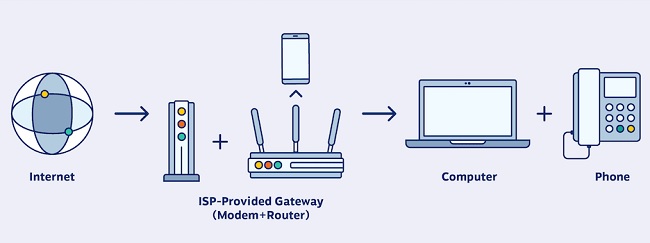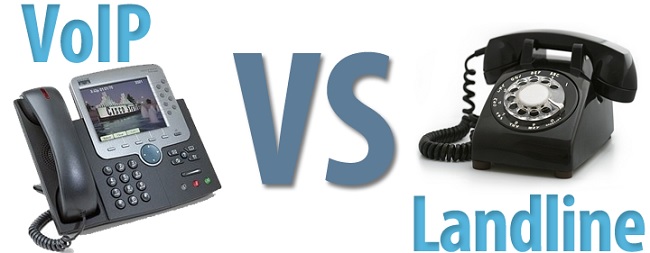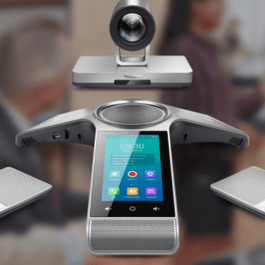The phone system you select might be a make-or-break decision for your company. When picking between a landline and a VoIP system, numerous factors must be considered, including cost, reliability, and functionality. While you may be tempted to dismiss a landline as an obsolete system in comparison to modern VoIP systems, there are numerous advantages to a traditional system that may be more suitable for your organization. Continue reading to find out which business phone system is best for you.
What is a Landline?
The landline phone system was invented in 1876 and has mostly stayed unchanged since then. Landline telephones work by transmitting signals from one phone to another through copper cable through a network of physical switch boxes, making them dependable and speedy, albeit maintenance can be complicated and time-consuming.
What is VoIP?
For phone calls, Voice over Internet Protocol (VoIP) makes use of your existing internet connection. It also includes some advanced calling features that are incorporated into the service.
A VoIP phone system is often referred to as a digital phone system or a hosted phone system. It converts sound into data packets and sends them to a VoIP service. VoIP companies then route calls between the Public Switched Telephone Network and the Internet (PSTN).
Thanks to lightning-fast cable or fiber broadband internet connections, this happens in milliseconds. VoIP enables small businesses to obtain all of the best telecommunication capabilities at a fraction of the expense.
Comparing VoIP vs. Landline
The most effective way to compare VoIP vs landline phone systems is to focus on four important areas: features, technology, reliability, and cost.
- Features
Landline phones have only the most basic functionality, however, VoIP phones have many more options, such as a virtual receptionist, voicemail-to-email, automatic call forwarding, three-digit dialing, and many more. If advanced features that function across numerous office locations, mobile devices, and the cloud are critical to your business, VoIP is the only way to get them.
- Technology
While the copper wire and exchange architecture of landline phone systems will most certainly continue to exist for some time, it is crucial to note that this is a legacy system that many phone companies are no longer dedicated to improving.
Digital communications are quickly becoming the new standard in both corporate and consumer technologies, and most phone companies have committed to constructing a digital infrastructure in the future.
- Reliability
Landlines have a modest advantage over VoIP phones in terms of dependability. However, as high-speed internet service providers continue to improve their capabilities, the minor difference in reliability between VoIP and landline will close. If reliability is an important factor in your VoIP vs landline comparison, talk to your internet service provider about what solutions are available to guarantee your connection is secure and satisfies the needs of the VoIP provider(s) you’re considering.
- Cost
When comparing VoIP vs landline service, the cost is frequently the decisive factor – VoIP is typically 40-80 percent less expensive than traditional landline phone service. Having several landline phones in a workplace necessitates the use of a private branch exchange (PBX). This is a real piece of hardware that is installed on-site and can cost tens of thousands of dollars. By removing the upfront investment, as well as the associated service and maintenance costs, VoIP becomes a significantly more affordable option – especially for startups and SMBs that only require a few lines as they grow.
Table Comparison
| Functionality | VoIP phones | Analog phones |
| Phone calls (PSTN) | Yes | Yes |
| Nationwide long-distance | Included | Optional |
| User-to-user calls | Yes | PBX required |
| Caller ID | Yes | Yes |
| Call Waiting | Yes | Yes |
| Ease of setup | ★★★★★ | ★★★ |
| Requires internet | Yes, 100 Kbps per line | No |
| Wireless | Wi-Fi, DECT, and Bluetooth headsets are available | DECT and Bluetooth headsets are available |
| Reliability during internet/ power outages | Calls can be routed to another number or voicemail. | Calls drop or are routed to voicemail. |
| Technology | IP telephony (SIP, TLS, and SRTP) | Analog voice signals |
| Call quality | ★★★★★ | ★★★★ |
Which Business Phone System is the Best?
Landline phone service cannot compete with VoIP in terms of flexibility, features, and convenience of use. If your current phone system is functional and you have no intentions to change how you use it, it may be OK to preserve it.
VoIP phone service is a popular option for both large and small organizations. It offers enterprises the most scalable and secure communication options. Uptime is seldom an issue with today’s dependable internet service. Furthermore, it has the potential to lower expenditures by more than half.
Choosing between a landline and a VoIP phone system is more complicated than it appears. Because each offers distinct advantages, the ideal solution is determined by your company’s requirements.
Explore IP Phone Products:
Related Topics:
3 Solutions for CISCO VoIP System
How does Video Surveillance System Work?
Buyer Guide: 5 Tips When Choosing IP Phones
Polycom Video Conferencing Vs Cisco Video Conferencing, How to choose?
How many Types of the Video Conference System? Which one can Enterprises Choose?






